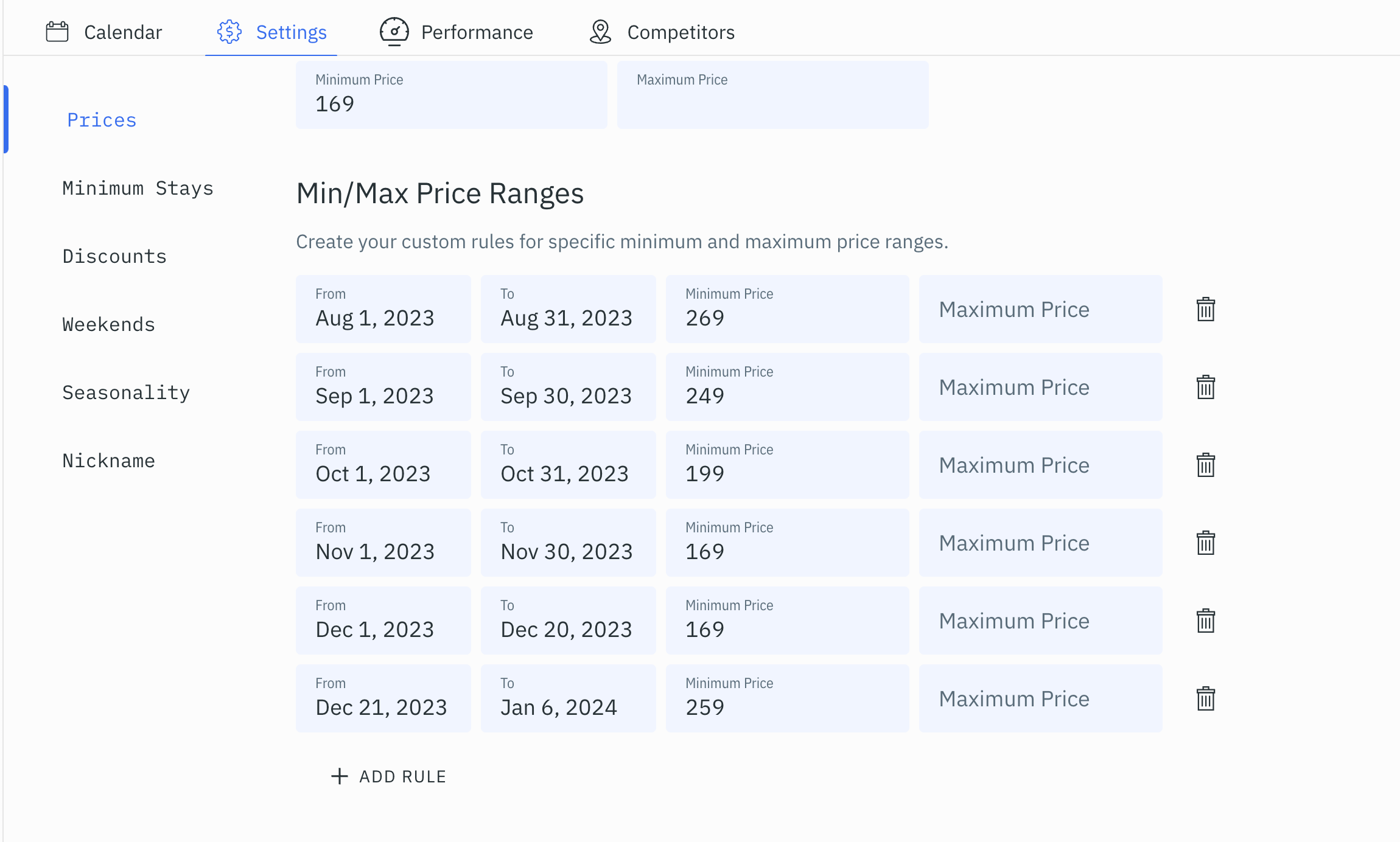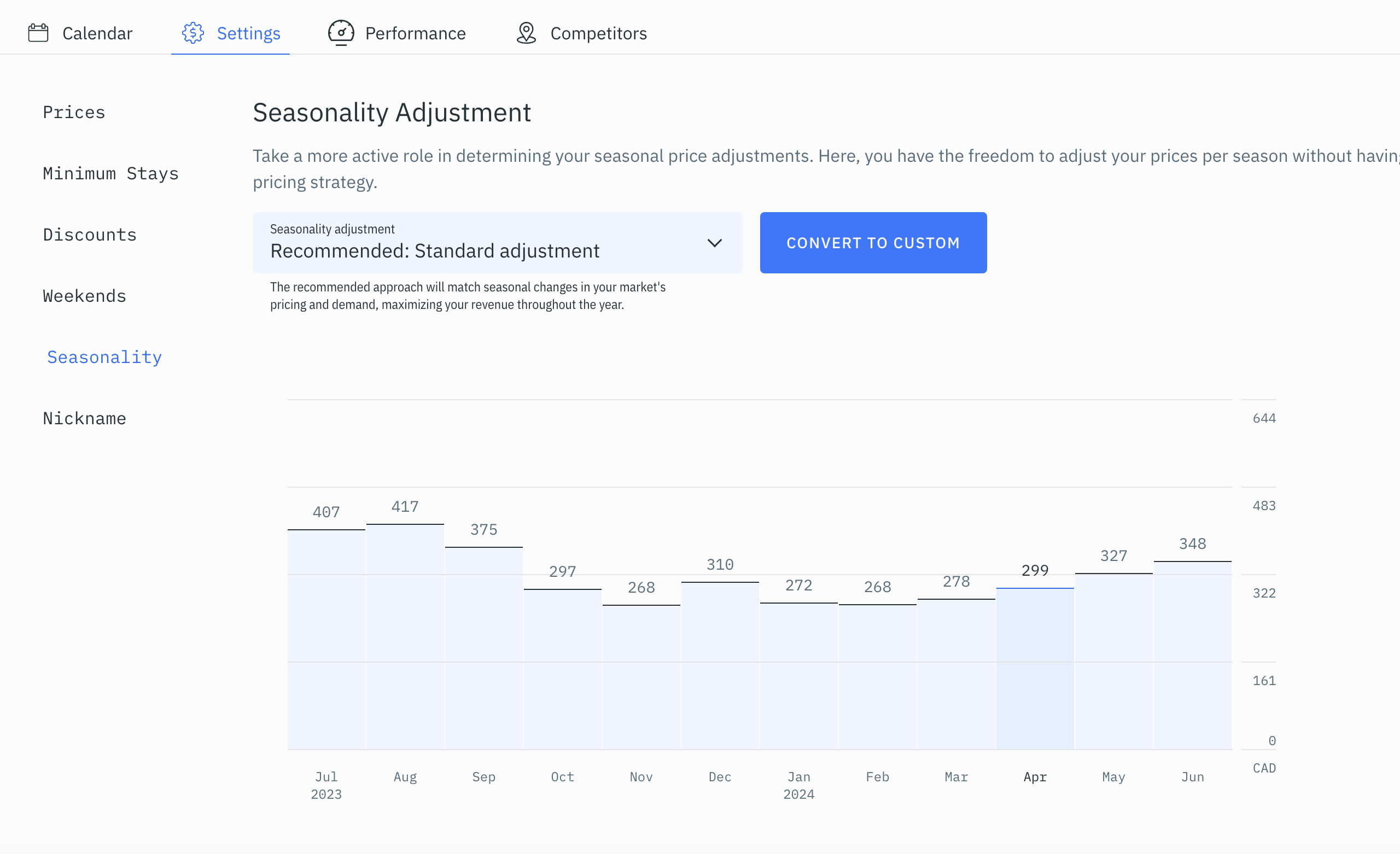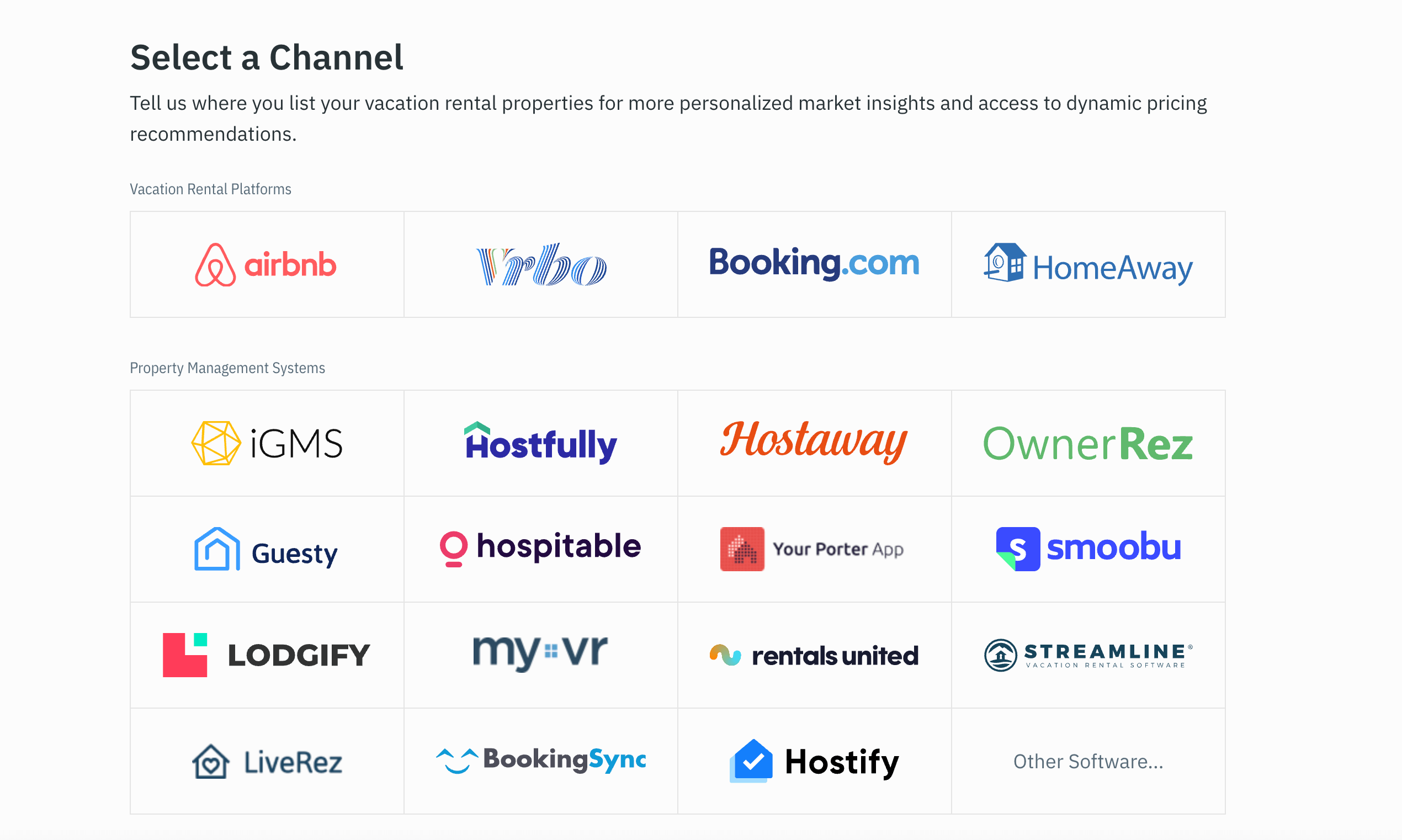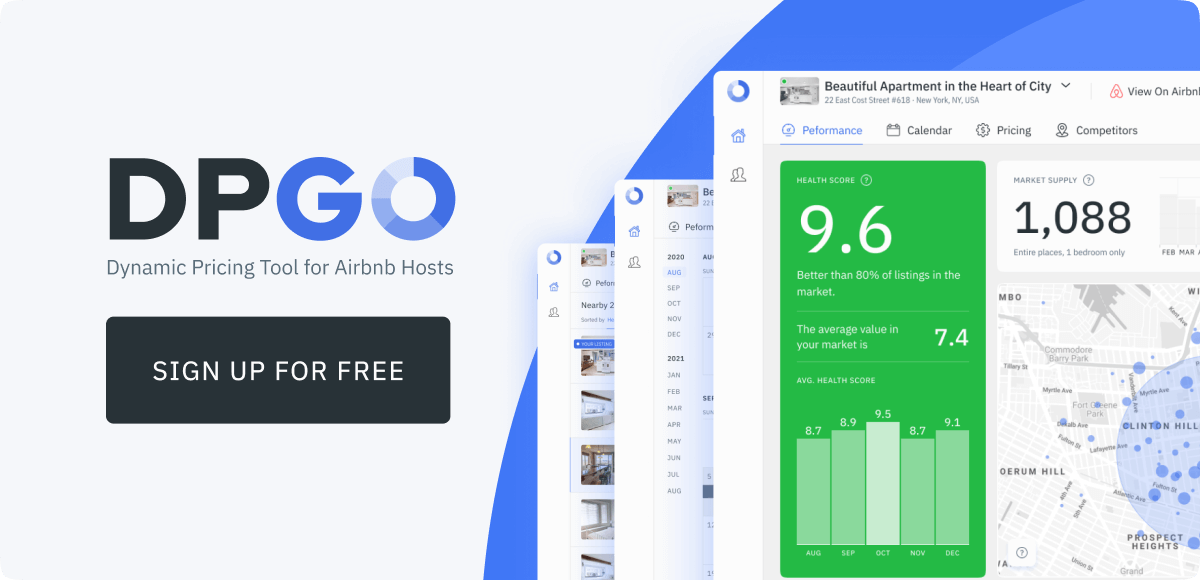At DPGO, one of our company ethos’ is that we are constantly pushing for new developments. After all, we are a company aimed at decreasing the effort levels required from hosts when trying to manage their vacation rental pricing. It may sound easy, but it’s far from it.
Pricing can never be static, it leaves too much money on the table at one end and loses your bookings at the other end. We have long since recommended to our hosts that they adjust their prices according to the time of year, the day of the week, and even the proximity to payday.
Date-Specific Minimum and Maximum Price Values
Date-specific minimum and maximum pricing settings have never been more simple! Just a few short days ago, we launched our latest advancements which will save you more time and give you even greater control over your pricing limits.
With these latest updates, hosts can choose a minimum and a maximum price for every month of the year. Guest traffic ebbs and flows according to the time of year, which means having the same minimum price across the board could be costing you bookings and losing you money.
Instead, use our handy suggestions (which we base on your competitors and other successful listings in the market) to set a specialized minimum and maximum price value per month.

How to Add a Date-Specific Min/Max Price Value
Let’s say, for example, that you want to update your minimum and maximum prices for December and the festive season. Instead of your general annual minimum price of $150, you want your minimum price for 1 to 20 December to be $169, and your minimum price from 21 December to 6 January to be $259. Here’s how you do it…
- Login to DPGO
- Click ‘Settings’
- If you’re not automatically on the ‘Price’ page, click on ‘Price’
- Scroll down to ‘Min/Max Price Ranges’
- Click ‘Add Rule’
- In the ‘From’ box, choose ‘1 December’ from the calendar display
- In the ‘To’ box, choose ‘20 December’ from the calendar display
- Enter your desired Minimum Price Value (in this case, $169)
- If you want to add a maximum price, enter your desired Maximum Price value*
- Click ‘Add Rule’ again
- In the ‘From’ box, choose ‘21 December’ from the calendar display
- In the ‘To’ box, choose ‘6 January from the calendar display
- Enter your desired Minimum Price Value (in this case, $259)
- Enter your desired Maximum Price Value, if you want to add one.
*You do not need to enter a maximum price value if you do not want to. In fact, most of our users opt not to enter a maximum price value. Instead, they choose to allow DPGO to get as much money per night as possible.
How Does This Help Me?
According to our data, hosts that adjust their pricing limits on a monthly basis see an average increase in annual revenue of between 10% and 13%. That’s a mammoth increase for very little effort on your part.
We’ve made it easier than ever to set different price limits for different months. All you need to do is examine your previous year’s booking calendar, identify when you had your highest booking rates, and enter specific minimum price values to ensure that you do not leave money on the table.
The vacation rental industry is all about selling your nights for as high a price as you can get. This is how you turn a profit. It’s also, in turn, why many hosts opt not to enter a maximum price value. Instead, they allow the DPGO smart pricing engine to win as much money per nightly booking as it possibly can.
Remember, we base your prices on your competitor’s rates, the global travel economy, local booking surges, events in your area, exchange rates, and more. They are what we call ‘informed rates’, as they come from hard data.

Why are Minimum Price Values Important?
There are a myriad of reasons why setting a minimum price for your vacation rental listing in your dynamic pricing settings is important. Without creating a rigid framework for your pricing, the cost per night value can (and often will) vary noticeably from day to day. Historically, customers do not react well to constantly changing prices.
Staying Economically Viable
Ensuring a minimum price helps hosts cover their costs and make a profit from renting out their property. Hosting on Airbnb involves expenses such as maintenance, cleaning, utilities, and possibly mortgage or rent payments. If the rental price falls below a certain threshold, hosting might become economically unsustainable for the host.
Maintaining Consistent Standards
By setting a minimum price, hosts can attract guests who are willing to pay for a certain level of quality and amenities. If a property is priced too low, it may attract budget-conscious guests who might have lower expectations, potentially leading to negative reviews and a negative impact on the property’s reputation.
Meeting Price Expectations from Returning Guests
A higher minimum price often indicates a certain level of quality and amenities. Guests who are willing to pay more usually have higher expectations in terms of cleanliness, comfort, and overall experience. Setting a minimum price helps ensure that guests who book the property have realistic expectations and are less likely to be disappointed.
Prevents Leaving Money on the Table
Setting a minimum price can help avoid the issue of frequent bookings for short stays. If the property is too cheap, it might attract guests looking for a quick, inexpensive stay, leading to a higher turnover of guests. This can be inconvenient for hosts and may negatively impact the property’s upkeep.
Protecting Long-Term Revenue
By maintaining a minimum price, hosts can protect their potential long-term revenue. Constantly reducing prices to attract guests might lead to a perceived devaluation of the property. On the other hand, a stable and reasonable minimum price can help preserve the property’s value and reputation over time.
Balancing Supply and Demand
Setting a minimum price can also help hosts manage the supply and demand dynamics in their area. During peak seasons or special events, demand for accommodations may surge, and setting a minimum price can help hosts capitalize on this demand and avoid underselling their property.

Why Are Maximum Price Values Less Important?
Maximum prices are arguably the least important out of minimum and maximum price values. This all relates back to the primary goal of a vacation rental host – to make money. All of the pricing engines on the market today have the same aim: to get you as much money per night as they can. Of course, each engine goes about it in a different way, but that is the overall goal. Here’s why maximum prices are often not entered by DPGO users:
Limits Profits
The main reason behind not entering a maximum price value is that hosts want DPGO to win them as much money as they can. Adding a maximum price limits the pricing algorithm and tells it that even if the demand is sky-high and the supply is incredibly low, you are unwilling to accept a higher rate than the one you have stipulated.
Sends Subliminal Messages About Value
If every other available listing for Superbowl Saturday is priced at $1,000 per night and yours is sitting at $400, what do you think this says about the value of your listing? Put in the nicest way possible, guests are likely to worry why your property is so much cheaper and most will avoid booking it altogether. Your determination to provide a fair price for your listing may just be scaring people away and sending the wrong message about the value and quality of your property.
Guests Do Not Track Annual Prices
If one of the reasons that you do not want to input a maximum value is that you worry your returning guests will notice the price increase, you have a few alternative options. Firstly, explain that the global economy is in a bit of a pickle lately and that you’re just keeping your prices in keeping with operating costs. Second, you can always generate special discount codes for your returning guests, if you want to offer them the same rate as last year. From a financial standpoint, this is a bad idea, but the intricacies of your pricing system are your business and the DPGO engine will follow whatever rules you put in place.





Comments are closed.